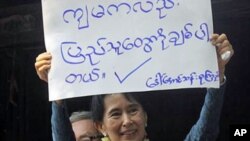Burma's military junta, fresh from solidifying its power in parliamentary elections earlier this month, has freed pro-democracy activist and Nobel Prize winner Aung San Suu Kyi from house arrest. The United States welcomes this long-overdue action and calls on Burmese authorities to ensure she has full freedom to travel, express her views, associate with her fellow citizens and participate in political activities in a manner of her own choosing. In this way, she may take part in helping build the democracy that the leaders there say the elections, the first in 20 years, represent.
A needed next step in this process, however, is that the more than 2,100 political prisoners languishing in Burma's jails be freed and that the government starts a dialogue with all stakeholders in society, including opposition and ethnic minority leaders. Like Aung San Suu Kyi herself, those voicing political dissent or pressing democratic reforms should never have been arrested in the first place. Democracy is about the will of the people and nothing can be achieved without their participation.
As part of our dual-track policy of pressure and engagement, the United States remains open to dialogue with senior Burmese leaders to promote progress on core concerns such national reconciliation, respect for human rights and the release of all political prisoners. As seen in the restricted national voting November 7, which were deemed by many in the international community -- including the United States -- as neither free nor fair, repressive policies remain in effect.
The United States stands steadfastly with the Burmese people who aspire for a peaceful, prosperous and democratic nation. To that end, we will continue to pursue parallel strategies of principled engagement with Burma's leaders and bringing pressure to bear for change. We will continue to work closely with the international community, including at the United Nations and other forums such as the Association of Southeast Asian Nations, to urge Burma to meet its international obligations to respect the human rights of its citizens.
Aung San Suu Kyi's Release Long Overdue

A needed next step in this process is that the more than 2,100 political prisoners languishing in Burma's jails be freed.


















